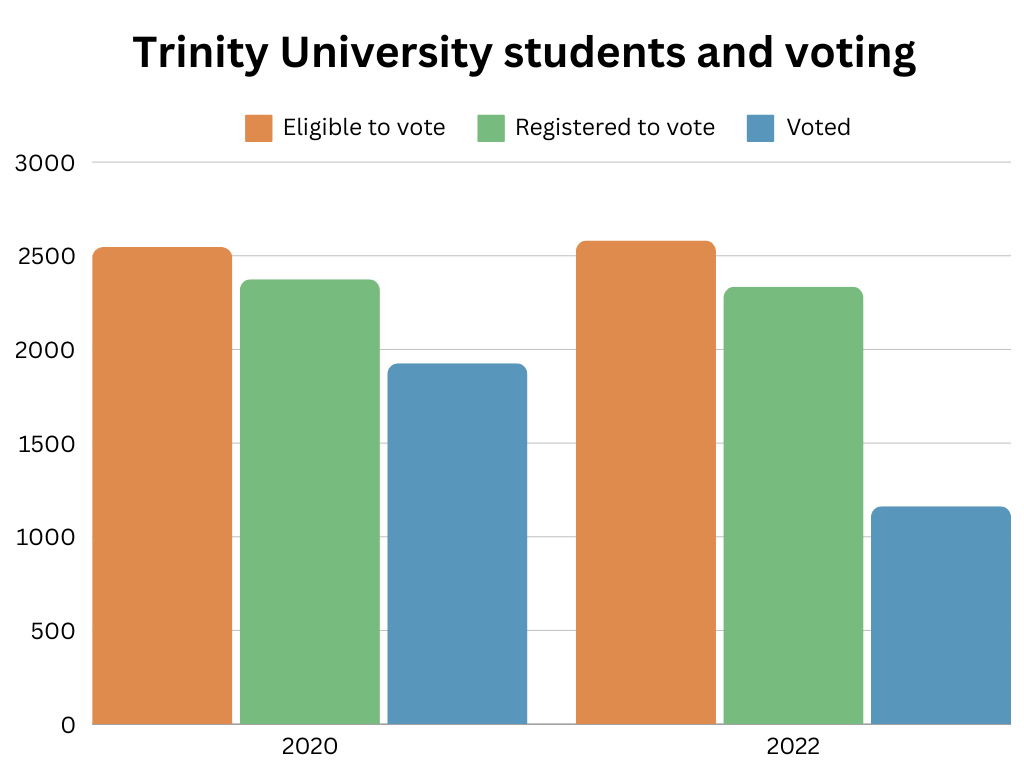We all understand the importance of voting, but knowing where to begin can be challenging. At a university that strives to create well-rounded students through its liberal arts education, you’d expect active promotion of civic engagement, and at this, Trinity University has actually done a phenomenal job.
Our school has been notably successful in promoting voter turnout among students — in fact, Trinity’s turnout actually has surpassed the national average for college students. During the 2020 election, while the national average for college students was about 66%, Trinity saw 75% of eligible student voters participate. Similarly, during the 2022 midterm elections, around 45% of Trinity students voted, compared to the national average of 31.3% for college students. These numbers reflect Trinity’s commitment to encouraging participation in the civic duty of voting.
Trinity demonstrates this commitment to voting through initiatives on campus led by Trinity’s “TU Voter Engagement Task Force.” Their All in Challenge Action Plan outlines several events and initiatives aimed at increasing voter turnout. Comparing the current Trinity action plan to those of previous elections, it’s clear that Trinity has expanded its efforts, demonstrating the university’s dedication to boosting voter engagement. Trinity’s All In Action Plan received the All In Highly Established Action Plan award. The award is given to select universities whose action plans are recognized for promoting voter engagement.
Registering to vote in Texas can be a time consuming process since online registration isn’t available and Texas makes it even more difficult not allowing you to vote with your college ID. Typically, you’re expected to print an application (or request one), fill it out and mail it to your county election office. Alternatively, you can visit your local voter registrar to complete the application in person or register when renewing your driver’s license. These methods are inconvenient to Trinity students, who might not have the time to go through these steps. To help address this, the task force organized Volunteer Deputy Registrar (VDR) training with Bexar County. This allowed students to become VDRs and register others to vote.
The voting process can also be confusing, especially with Texas’ somewhat outdated and slow state voting website. To combat this, Trinity has an extremely robust and modern website on voting and voter engagement. The task force has consistently provided helpful information by tabling across campus in high-traffic areas.
In addition to new initiatives, the task force continues to implement previously successful strategies. For example, they plan to provide transportation to polling locations on early voting days and Election Day, an invaluable service for students who might otherwise struggle to reach polling sites. This continued dedication shows Trinity’s genuine commitment to ensuring its students have every opportunity to vote.
Given the importance of the current election, many people across the country would benefit from mental health-related support both during and after the election. The Trinity community, recognizing this, has planned several events to meet this need. For instance, the “Your Mental Health + Politics Resource Fair,” hosted and created by Active Minds and Wellness Services was crucial in providing this support — but what’s even more impressive is the planned resources after the election. These resources include post-election listening circles and an election night reprieve at the chapel, with more to be sent by email and posted on social media. This very clearly demonstrates a commitment to supporting and engaging students, rather than merely just increasing voter turnout. Election results have the potential to fundamentally impact the country, so it’s truly refreshing to see Trinity offering these types of resources.
This isn’t to say the university hasn’t had its share of misguided efforts. Take the recent TurboVote Competitions for instance, a competition measuring the number of sign-ups for TurboVote — a non-profit that aims to increase voter engagement by providing voter resources. While there were separate competitions for sports teams, student organizations and residence halls, most students who did know about it probably got their information from a single, ineffective email from Gaje Wiseman, the residential life coordinator. While TurboVote is a valuable resource, some students may have been unaware the competition was even happening due to the event’s poor marketing. After the original was advertised, there were no follow-up emails and no signs across campus, meaning that once the initial email got buried, most students never heard about it again.
Additionally, the competition’s format was strange. Results were based on the percentage of students in each residence hall, who signed up for TurboVote. With residence halls this made it difficult for larger dorms, like Bruce Thomas Hall and City Vista, to encourage participation due to their size. The competition also only allowed four days to sign up, making it difficult to sign up in time.
However misguided the effort may have been, the concept behind it was solid: encourage people to sign up to receive relevant voter information. Additionally, if the competition had been better promoted, it likely would have been far more successful. The responsibility for the residence hall competition didn’t fall on the task force but instead on Residential Life, who collaborated on the competition and sent the original email.
Despite Trinity’s shortcomings in other areas (and there are plenty), the university clearly has a strong commitment to promoting voter engagement among its students. Through the TU Voter Engagement Task Force and its initiatives, the university has done a good job of making it easier for students to participate in the upcoming election. While some efforts like the TurboVote Competition missed the mark, Trinity is dedicated to encouraging voting. Other universities could take a page or two out of the Trinity playbook.






